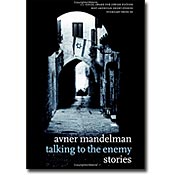
As even the most casual observer of the American political scene is aware, our White House has been occupied for some time by a man with a serious inferiority complex about his father. This has a lot to do with Papa Bush’s service in the Pacific theater during WWII, where he piloted Avenger fighter planes that he named after W.’s mother. The psychological difficulties occasioned by this have, among other things, caused W., maybe, to be a little trigger-happy.
Other nations have this generational problem, too—the British, for example, endured the Blitz and kept European civilization alive at its darkest hour—causing their sons various neuroses. But nowhere is the situation as acute as in Israel, where the men and women of the WWII generation left the Displaced Persons camps and came to Palestine and displaced some persons themselves and fought off five invading armies and founded an entire country.
Avner Mandelman’s Talking to the Enemy is a collection of stories about the Israeli sons of those men and women. Like their American counterparts, they feel inadequate, even though, unlike their American counterparts, they won their sixties war (it took them six days) and have been taking care of other business since. The narrator of “Pity,” for one, is entrusted with the kidnapping of a former Nazi named Karl Joachim Gross. “At first,” he says, “after I had tracked Gross down in Paris, the Memuneh, the Mossad’s chief, got cold feet and wanted to take me off the case. But then my father intervened and said I was a pro, he had trained me himself, I could handle it… . So they let me continue, but they glued Léon Aboulafia to me, a Moroccan Jew from Casablanca, who knew Nazis only from the movies.”
The action takes place around 1970. As they wait for Gross in a dark store across the street from his Paris home, the narrator thinks of his father, the only survivor from his large Lodz family. There is something a little absurd about chasing Nazis so late in history—not just because the world has moved on, but because the Nazis are so old. When the time finally comes, things go wrong. The narrator is suddenly seized with dovelike scruples. He is a tough guy, but his father was tougher.
And they keep reappearing in the stories, these fathers, even as the sons grow up, kill people, get married, have children. They come from “that other planet,” as one of the narrators calls the camps, and they are different from you and me. In one comic story, we hear the tale of Uncle Nathan, so virile that he had two wives and a concubine, scandalizing the Israeli rabbinate. In another, a grown-up Mossad agent remembers how, as a little boy in Tel Aviv, where the children identified themselves by the camps their parents had been through, he watched and cheered as his brother was beaten in their courtyard. When his father returned home and learned of this shameful behavior, he slapped the boy, “stop[ping] me in mid-word, the blue numbers appearing and vanishing in a flash.”
Mandelman is himself from the generation of the sons—his bio states that he served in the Israeli Air Force during the Six-Day War. He has been living in the U.S. and Canada for a while now, and he writes in English. Sometimes he sounds a little shticky, purposely inverting syntax (“After his second wife died also from cancer … ”) like he knows how Jews are supposed to sound in this language. And he is a cruder writer than Nathan Englander or David Bezmozgis or Todd Hasak-Lowy, all of whose stories have dealt impressively with how contemporary Jewish men aren’t quite the mensches of the Jewish past. But Mandelman’s material is richer, and he tells it with more urgency.
In my favorite of these stories, “Life in Parts,” the narrator is taken by his father-in-law to meet the father-in-law’s banker in Zurich—in case something should happen to the older man. The father-in-law’s biography is quickly sketched: He was from France, had joined the Resistance, “and after the war ended hunted a few Nazis, on his own, before coming to Israel.” Now he has adopted the epicureanism of the old and wealthy. On their way back from Zurich, he takes the son-in-law through Paris, to a five-star whorehouse, and then to lengthy repasts at the finest restaurants. Just before leaving, they ride in a cab to the station outside the city from which the trains were sent east, to the camps, during the war. They fly back to Tel Aviv. Just before they land, the father-in-law turns suddenly to the narrator:
“Tell me again, the number. But not loud. In my ear.”
As the plane banked, I whispered in his ear the number of the Swiss bank account, very softly.
“Remember!” he said, clutching my hand.
“Don’t forget!”
Involuntarily, as the story ends, you connect the bank number to the concentration-camp number on the father’s hand when he slapped the boy in the earlier story. And the call to remembrance is, of course, the main tenet of all Holocaust literature. It’s a little schematic. But there’s something about them landing as they do back in troubled Israel, the old man’s final instructions, the burden of the living … What Mandelman manages to suggest, in his tough-talking way (one of these stories appeared some years ago in the right-wing journal Commentary), is that when the fathers have spent so long waging war and killing Nazis, the most pressing and difficult task for the sons is not to wage more war and kill more Nazis. It is to make peace.
Talking to the Enemy
By Avner Mandelman.
Seven Stories Press.
144 pages. $20.